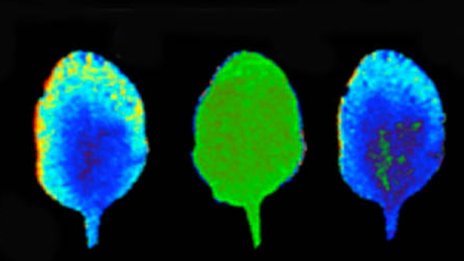Thinking Green

A “vegetable” is a derogatory term for someone who lacks brain function — a slang term borrowed from the flora world because plants lack a central nervous system. Plants can’t think, so the term, while crude in many senses, has entered our parlance.
But it may surprise you to find out that plants can remember stuff and react to it.
In 2010, researchers at the Warsaw (Poland) University of Life Sciences shined fluorescent lights on single leaves on plants, as seen above. They discovered that the exposed leaf underwent a chemical reaction due to the exposure. That reaction spread through the plant, as if the one leaf had communicated, via a nervous system, that information it had received. And even more incredibly, the plant was able to retain that information even after researchers removed the light source from the exposed leaf. Professor Stanislave Karpinski, who led the experiments, told the BBC that this latter finding was “a complete surprise.”
And then, things got even more amazing. The researchers exposed the leaves to different types of light — red, blue, and white — and the plants reacted differently to each type of light. Karpinski theorizes that different days, seasons, or environmental factors create different light, and the plants have evolved in such a way that they can use that information to their benefit. For example, as he explained to the BBC, the plants can use this information to defend themselves against likely pathogens:
When we shone the light on the plant for one hour and then infected it [with a virus or with bacteria] 24 hours after that light exposure, it resisted the infection. But when we infected the plant before shining the light, it could not build up resistance. [So the plant] has a specific memory for the light which builds its immunity against pathogens, and it can adjust to varying light conditions.
While Karpinski likens this to “a form of intelligence,” that is probably an overstatement — but, certainly food for thought.
Bonus fact: Shining a laser pointer at an airplane cockpit is against the law in most U.S. jurisdictions. Why? Because the diffused light is still strong enough — and the beam then wide enough — to temporarily blind the pilot, as seen here. According to the Lodi News-Sentinel (California), at least two people have received two-plus year jail sentences for pointing their lasers at planes or helicopters.
From the Archives: Liquid Memories: Moths retain the memories they develop as caterpillars, even though they liquefy in the transformation process.
Related: “The Secret Teachings of Plants: The Intelligence of the Heart in the Direct Perception of Nature” by Stephen Harrod Buhner. 4.5 stars on 24 reviews. Available on Kindle.

Leave a comment